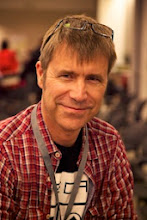Fantastic sculpture.
It brings to mind that more and more we are operating on the level of the black-box, of magickal thinking, of objects and processes that 'just work' ... until they don't. That computing was once transparent, but is no longer. Consider most of your mobile phone experiences, hopefully fantastic, but when it stops you must find an expert, or replace the now no-longer magickal, now 'imp free' device.
In many ways, this is the goal of the 'consumer' device.
Living in an age of magic made real is very appealing in many ways, we can ignore the constraints of time and space to communicate with our friends and colleagues all over the world. We live in an age where the combination of skills can solve most any problem, as argued persuasively by Matt Ridley in his optimistic talk on ideas 'having sex' http://www.ted.com/talks/matt_ridley_when_ideas_have_sex.html. But, increasing it feels like we're losing the ease, from earlier generations, of being able to understand the underlying process, of unpacking all the way down to creating that water wheel, etc. Of being able to tune our own car engine, or indeed to fix our TV. Indeed, it seems that we've become so very good at using modules, at sub-processes, at, arguably, code/module re-use. And where, ultimately does this leave us? How complex an infrastructure might we be able to maintain?
The reality is that this is not a new thing, indeed it has been going on in computing repeatedly as we create a useful abstraction: adders, CPUs, memory, virtual memory, virtual users, virtual machines, and so on. What's new is that we're heading to an age where the outcomes from computing are more and more 'commodity', packaged, wrapped, and protected from meddling. More and more .. part of the world.
This is not a new process. Indeed, the reuse of modules for factories, for commodities, for food, for almost everything in the modern economy is created in such a way. Leonard Read had a wonderful essay in 1958 showing that no one knew how to create 'even' a pencil http://www.thefreemanonline.org/featured/i-pencil/.
Software is more and more just a component piece for pretty much 'everything'. We can see this in the move from transparency to packaged objects designed to be opaque. This is the transition for software, for computing, to be absorbed, as never before, into the broader economic process.


No comments:
Post a Comment